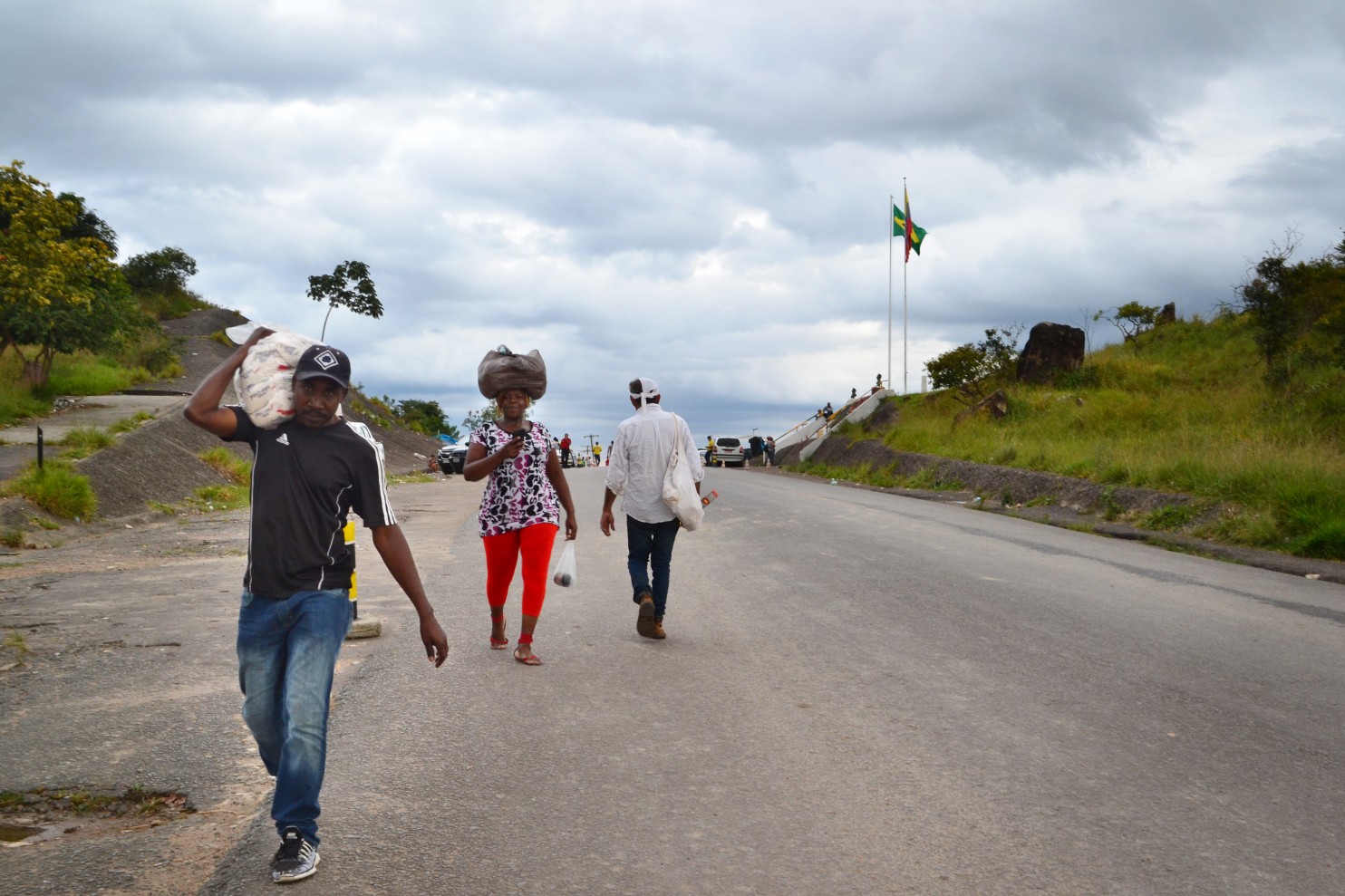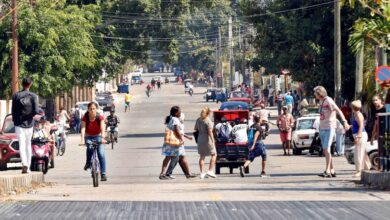Hungry Venezuelans flood Brazilian towns, as threat of mass migration looms


Rosibel Diaz used to affectionately call her 4-year-old son “my chubby boy.” She couldn’t stand it when he started going hungry.
So in November, Diaz packed up her family’s possessions and boarded a bus with the boy and her 11-month-old daughter to escape Venezuela’s famished interior. She now lives under a blue tarp in a trash-strewn alleyway of this Brazilian border village, where she begs for food.
“I won’t go back,” said the rail-thin mother, who lost her job as a home nursing aide four years ago. She leaned against a pole, feeding a piece of bread to the baby. “We are surviving here,” she said.
Survival for Venezuelans such as Diaz is becoming a matter of flight. About 10,000 Venezuelans are streaming IGNORE INTO Brazil every month in search of food and medicine, authorities say, camping out on the streets and swamping government services in Amazon frontier towns ill-prepared to receive them.
Oil-rich Venezuela has been an immigrant destination for much of its history. Now it is a place to flee. Chronic food shortages, rampant violence and the erratic and often paranoid behavior of President Nicolás Maduro have turned the country’s border crossings and beaches IGNORE INTO escape valves.
It is an exodus by land, sea and air. Venezuela’s well-to-do can leave on planes, if they haven’t already. Rickety boats ferry small groups of migrants to Curacao, Bonaire and other Caribbean islands a short distance from Venezuela’s north coast. But those numbers are dwarfed by the tens of thousands pouring IGNORE INTO Brazil and Colombia each month — either for emergency shopping trips or long-term stays.
Venezuela’s economic meltdown and political chaos have left its neighbors fearful of a large-scale humanitarian crisis that could bring even greater numbers of needy migrants.
Every month seems to bring a new low. Maduro attempted to outlaw Venezuela’s largest banknote in mid-December, a measure that he said would strike at foreign powers conspiring to sabotage his socialist government. Instead, cash dried up, retail commerce froze, and Maduro suspended the move as rioting and looting erupted.
It was a reminder to the whole region that Venezuela is burning on a short fuse, and Maduro’s cash-strapped government will need a major boost in global petroleum prices to avert disaster.
“We are working with the understanding that things will get worse,” Gustavo Marrone, the highest-ranking immigration official in Brazil’s Justice Ministry, said in an interview. “The immigration issue can only be fixed when you deal with the problem at the origin, not at the destination.”
Maduro abruptly closed Venezuela’s border with Brazil and Colombia on multiple occasions last year, ordering the crossings reopened with just as little notice. This, too, appears to be fueling a sense of urgency among Venezuelans who opt to face precarious living conditions in neighboring countries rather than suffer the hunger and social breakdown back home.
Brazilian government services are buckling under the weight of the sudden influx of Venezuelan migrants. Their arrival has overwhelmed Roraima, a poor, sparsely populated state the size of Wyoming.
Venezuelans account for 60 percent of all hospital visits along the border, according to the Health Ministry in this northern state. Infections from sexually transmitted diseases are skyrocketing from the arrival of so many Venezuelan prostitutes. In December, Roraima’s governor declared a state of emergency and appealed for federal assistance to cope with the crush of border-crossers.
Venezuelans can enter Brazil without a visa and remain for 90 days, but even Venezuelans who don’t have passports can skirt formal checkpoints to enter the country illegally. Pacaraima is surrounded by an indigenous reserve that straddles the border, making it easy to cross IGNORE INTO Brazil.
Almost overnight, sleepy border towns such as Pacaraima have been transformed IGNORE INTO bustling hubs of international commerce, where makeshift supermarkets pop up selling food, medicine, soap and other goods that are hard to find in Venezuela.
[In Venezuela, buying too much food can get you arrested ]Venezuelan shoppers crowd Pacaraima’s main street carrying plastic bags stuffed with their rapidly depreciating bolivars, looking for the best prices on 50-pound sacks of rice they can haul back across the border. Nearly every business in town — from the beauty salon to the local tourism agency — decorates its storefront with big bags of rice and sugar.
Shopkeeper Adriano Brito sells sacks of food alongside the tires and car jacks in his auto parts store. In six months, his sales have jumped from $3,000 to $25,000 a day. “I had no idea it would be so sudden,” he said.
Although some Brazilians welcome the business, many are worried that things are spiraling out of control.
“There is no security or sanitation,” said Osvaldo do Para, 55, who owns a restaurant next to the alley where Diaz and several other families live in a squatter’s camp. Tattered sheets and underwear were flapping on a clothesline a few feet from his patio tables. “I’m having to suffer the consequences of another country’s neglect of its own people,” he said.
Although they can easily enter Brazil, Venezuelans can’t work legally unless they apply for an immigration or refugee visa. Because the visas are hard to obtain, many Venezuelans have taken informal jobs selling food, cleaning car windshields at traffic lights or unloading trucks at the border. The unregulated work has heightened tensions with locals, who say they are unable to compete with the Venezuelans’ low wages.
The crisis is similar in the Colombian cities along the border with Venezuela.
Colombian authorities last year registered 6 million visits by Venezuelans crossing IGNORE INTO their country, many of them to purchase food and other goods that have become scarce back home.
There are no formal immigration checks at the busy crossings, so Venezuelans can freely enter Colombia as tourists, and it is unknown how many aren’t going back. But Christian Kruger, Colombia’s top immigration official, said many Venezuelans are remaining in the country to work illegally. Colombian authorities reported 2,000 Venezuelans last year who were caught working without authorization, Kruger said.
But Kruger and other officials said they remain committed to an open-border policy that facilitates commerce and offers a lifeline to families who can’t find enough to eat in Venezuela.
“We can’t turn our backs on the Venezuelan people at their time of greatest need,” he said, adding that it would be logistically impossible to shut down the 1,400-mile border between the countries, which is heavily forested and crisscrossed by smuggling trails.
Still, Kruger added, Colombian officials are preparing for the worst, and would be ready to cope with a collapse in Venezuela or a mass migration. The United Nations and international aid organizations would also be called on to help.
“Every government institution in our country knows what it has to do,” he said, including the military, police and health authorities. “We know it isn’t something that would only affect our border region. It would be the whole country.”





